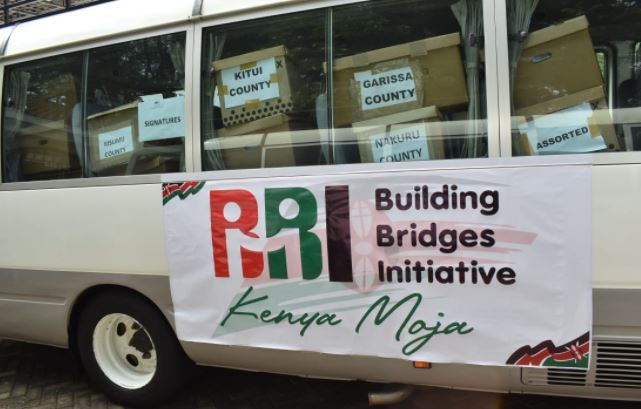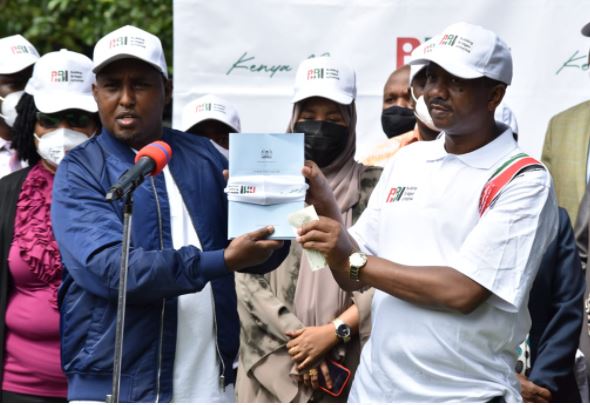The Building Bridges Initiative (BBI) Secretariat is headed to the Independent Electoral and Boundaries Commission (IEBC) offices to present over three million signatures collected during the BBI drive.
They will be at the Anniversary towers in Nairobi that houses the commission’s offices any time from now.
The team began a procession from their National Secretariat offices at State House Road, Nairobi to the offices on foot.
They had two buses fully stacked with the over three million signatures, assorted into boxes representing various counties, and will be received by IEBC Chair Wafula Chebukati.


Chebukati who received about 4.4 million signatures said: “Our work starts here as a commission, we shall proceed and request for a budget from the National Treasury, and get a referendum committee to commence the exercise of verification.”
The commission says it will be giving periodic updates as it unsure how long the verification exercise will take.
The team was led by National Assembly Minority Whip Junet Mohammed and his co-chair at the BBI Secretariat Daniel Waweru.
Speaking before the procession, Junet said that the team is ready and that “the train has left the station and those who have been left behind should catch a taxi to the next station.”
He also took a swipe at Makueni Governor Kivutha Kibwana for seemingly changing gears. Junet challenged Governor Kibwana to honest with Kenyans saying: “Don’t tell Kenyans that you have not been part and parcel of this process.”
What we know so far
Initially, about 5.2 million signatures were collected, but after verification by the Secretariat, the numbers came down to around three million signatures. The team said it was working with the register provided by the commission to verify if those who signed were registered voters.
The BBI Secretariat says they have made the process simpler for the commission by assorting the signatures by county and constituency level.
First, IEBC has to ensure that all signatures are from registered voters. If the IEBC is satisfied with the signatures, it shall submit the draft Bill to each county assembly for consideration within three months.
Thereafter, if a county assembly approves the draft Bill, the speaker of the county assembly shall deliver a copy of the draft Bill jointly to the Speakers of the two Houses of Parliament, with a certificate that the county assembly has approved it.
If it is approved by a majority –24 — of the county assemblies, it shall then be introduced in Parliament.
Different factions say the referendum could happen anywhere between April and June 2021.
There are growing concerns on whether the electoral agency has the budget to conduct the verification exercise.

No more changes
Yesterday, BBI secretariat co-chair Dennis Waweru maintained that there would be no more review of clauses in the Constitutional (Amendment) Bill, 2020.
National Majority Leader Amos Kimunya also ruled out a further review of the BBI Bill, saying it would be unfair to Kenyans who have already appended their signatures in support of the document.
“The BBI signature train has already left the station. We have the President and Raila’s full support and those opposed are at liberty to vote based on their conscience. We understand we have slow adopters and they can join us at different stages,” Kimunya said.
Parties challenging the Building Bridges Initiative also suffered a setback on Wednesday after the Supreme Court sent them back to the Attorney General.
A court ruled that the petitioners should seek the AG’s advice before it can take up the cases.
There are at least five cases filed before the High Court by economist David Ndii and others co-joined, nurses’ union, Thirdway Alliance and Justus Juma as well as the one by Isaac Ogola and James Gitau- a Kenyan voter based in the US.
Credit: Source link